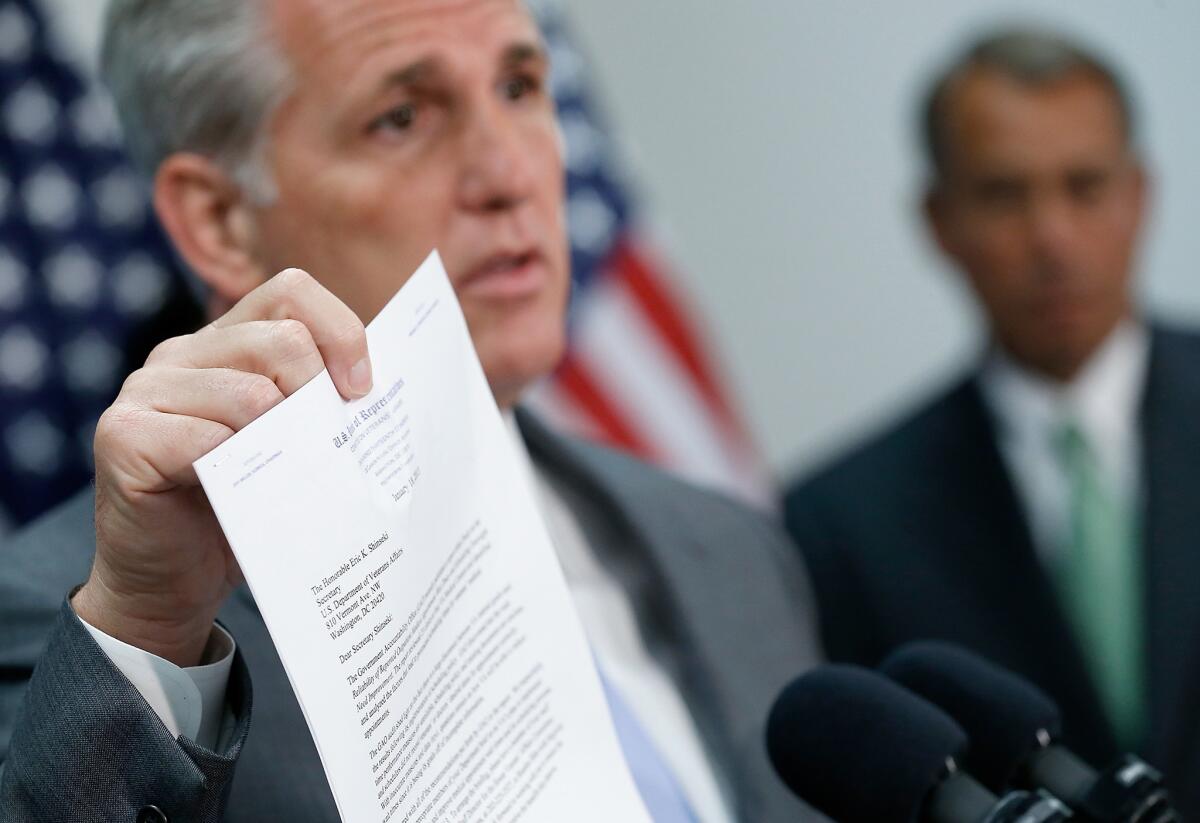Could Eric Cantor’s loss be California’s gain?

- Share via
Reporting from Washington — Will House Majority Leader Eric Cantor’s stunning fall result in a rise in congressional influence for California?
Maybe, because the lawmaker perhaps best positioned to fill Cantor’s job is Rep. Kevin McCarthy, a Republican from Bakersfield.
McCarthy, the current majority whip, hasn’t said yet if he intends to make a run for the Cantor post, but Capitol insiders say they would be shocked if he did not.
McCarthy is a prodigious fundraiser who, along with Cantor, helped orchestrate the GOP takeover of the House in 2010.
He has quickly risen through the ranks of his caucus since arriving in Congress in 2008. Many of the tea partiers who have grown restless with other GOP leaders give him a pass because he avoids arm-twisting as he gathers votes on the floor, the chief role of the whip.
And McCarthy has nearly $2.9 million in his campaign war chest -- one of the largest in the House -- which he can use to help colleagues win reelection in midterm elections this November, a sure-fire way to bolster support.
“Kevin starts out as the front-runner,’’ said Kurt Bardella, a Republican strategist and former congressional staffer. “Kevin is all about coalition building and building personal relationships with members of his caucus.’’
Still, McCarthy would face considerable competition should he pursue Cantor’s post. Contenders will likely make the case that fresh blood is needed at the top to forge a new, unified path for the caucus. Some say McCarthy is not conservative enough.
“It’s got to be somebody outside the current leadership structure,” said Rep. Tim Huelskamp (R-Kan.), a tea partier. “They just don’t listen.’’
Potential rivals include Reps. Jeb Hensarling of Texas, a former House Republican Conference chairman; Steve Scalise of Louisiana, chairman of the Republican Study Committee, an influential group of conservatives; Paul Ryan of Wisconsin, chairman of the House Budget Committee and a former GOP vice presidential candidate; Tom Price of Georgia, a former chairman of the House Republican Policy Committee; and Pete Sessions of Texas, chairman of the House Rules Committee.
McCarthy’s collegiality could prove a liability should he seek to move up the ranks of leadership.
During his tenure, the House has been more fractured than ever. Some House veterans say his unwillingness to play hardball has been a factor in the GOP’s inability to hold together on deals forged with Democratic leaders on major policy measures.
McCarthy was in the leadership team when an insurrection in the caucus forced the federal government shutdown last year, a politically damaging moment for the GOP.
Throughout much of that crisis, it seemed that GOP leaders had lost control. McCarthy made the argument that there was virtue in not bringing the hammer down on colleagues.
He and the others in the leadership team had campaigned on a reform platform that included ending earmarks, which leadership had traditionally used to keep colleagues in line. They vowed the House would not be run the way it was by former GOP whip Tom Delay of Texas, nicknamed “The Hammer”, who meted out punishment against colleagues who defied his wishes.
Californians had their greatest degree of clout in Congress during the Obama administration when Democrat Nancy Pelosi, a San Francisco liberal, was speaker.
McCarthy is on the opposite end of the political spectrum, and his ascension in the House would have a very different effect on California.
Among his signature issues is relaxation of environmental rules that limit the use of water by Central California farmers. He has also launched a crusade against California’s high-speed rail project, championing measures to halt federal funding for it.
McCarthy is also a close ally of the oil and gas industry, and he is pushing for policies that preserve its ability to conduct hydraulic fracturing, or fracking, in California.
An infusion of federal spending to California would be unlikely were McCarthy to replace Cantor.
Congressional Republicans are under pressure from party activists to cut the budget. There would be limits to what McCarthy, even in a more powerful job, could do for the state given his need to represent the broader -- and sometimes conflicting -- interests of House Republicans, and their disdain for a large liberal state with some of the country’s most generous government programs.
The majority leader sets the legislative agenda for the House floor, is a high-profile spokesman for his party, plans political strategy, mediates political disputes among the rank and file and can be a key player in negotiations with the president over legislation.
The next majority leader also becomes a leading candidate to succeed House Speaker John A. Boehner (R-Ohio).
McCarthy’s fate could rest on the outcome of the fall election. Who become the future leaders of the caucus may depend on whether it moves further to the right.
More to Read
Sign up for Essential California
The most important California stories and recommendations in your inbox every morning.
You may occasionally receive promotional content from the Los Angeles Times.















